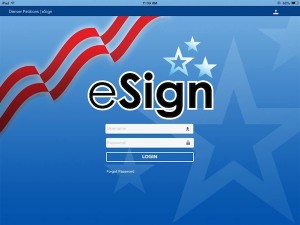South Dakotans are having all sorts of fun circulating petitions for ballot measures this year. Petitioning would be even more fun and efficient if we adopted the Denver Election Division’s awesome electronic petition app for tablets!
The Denver Elections Division’s rollout of a tablet app for candidate petition signing this year has received a top award from a national professional group of election officials.
In the ballot-qualification stage of the spring municipal election, some candidates checked out tablets loaded with the app. Supporters signed on the screen, allowing the campaigns to quickly verify the person’s registration and keep a running total of signatures.
That saved campaigns from the uncertainty that typically leads them to collect many more signatures than needed before turning in candidacy petitions.
On Thursday, the Election Center presented the Democracy Award to Elections Division director Amber McReynolds at its national conference in Houston [John Murray, “Denver Election Officials Win National Award for Petition Tablet App,” Denver Post, 2015.08.21].

The system isn’t perfect: 3% of the e-signatures were invalidated. However, the invalidation rate for traditional signatures was 29%. The ability to check and count voter signatures right away made life much easier for candidates: the Denver Elections Division says that every candidate in this spring’s municipal election who used their app qualified for the ballot on the first submission.
And don’t forget how much nicer it would be to carry a single iPad instead of a clipboard of papers on a windy South Dakota day like today.
Denver company 303 Software produced the eSign app for Denver Elections. ESign may be the first road-tested electronic petition app in the U.S. Denver’s municipal election candidates had to gather 300 signatures; the software would require little if any adjustment to handle a statewide petition drive requiring thousands of signatures in South Dakota. Secretary Krebs, call Denver Elections and 303 Software today!
I wonder who pays for the fancy computers people use to go around getting their initiated measures ginned up. If it can work on their own computers and somehow the State Secretary can make sure it is all legitimate then it might be OK. If the government has to buy fancy computers for every crazed idealogue out there then I don’t like it. I don’t like it at all.
In today’s Strib I read an article about a new tablet app for taking notes. It allows the writer to rest the heel or side of her hand on the tablet as she writes. No weird black marks are left behind and writing is more legible. Meld this with the petition app and the error rate might decrease even more.
I propose a tax on Grudz. That should cover lots of iPads.
Seriously, though, the state doesn’t need to provide all the equipment. Just get the app, allow citizens to download it onto their devices, and we’re in business. I suspect any serious petition organizing group will find the savings in time and certainty worth the investment.
Deb! My Samsung Galaxy Note is pretty good about not picking up my hand prints while I’m writing, and it’s a couple years old! If Shantel hooks this app up to the SD voter database, I will use my Samsung to circulate. Whoo hoo!
This would be a great tool.
There are still some issues that needs to be worked out. Like areas that don’t have WiFi or 4G access. or during events where the cell traffic has gridlocked the networks.
I would like to see it beta tested in South Dakota come Feb 2015
MC, I’m betting we could easily have this system in place by the time candidate petitions are made available on January 1, 2016.
For Internet access, we make sure petitioners are armed with smart phones that can be used as hotspots. That should provide access almost anywhere petitioners currently work.
I wonder, though: if we add this technology as an additional means by which petitioners may get themselves or their issue son the ballot while continuing to allow non-techie petitioners to use pen and paper, do we create an unfair inequality in ballot access? We already have an inequality in which wealthier candidates and organizers buy their way onto the ballot by hiring circulators; does this technology create an unfair advantage?
As I’m thinking through the issue, it strikes me that eSign makes life easier for the low-budget grassroots petitioner. I have a hotspot-producing phone; so do many of the circulators I’ve worked with. We’d save time and money by being able to verify every signer as we work.
Of course, if Internet access is problematic, the Secretary of State could offer free downloads of updated voter files to all users. Download that update to your tablet, and you don’t need Internet access to verify voter status.
eSign could offer a tiny little uptick in privacy, too. Consider that when you sign the first line on a paper petition, everybody else who signs that sheet sees your name at the top. On a tablet app, your signature, name, and address would go in their own input boxes, then be filed in memory. The next signer would see a new blank window and none of your data.